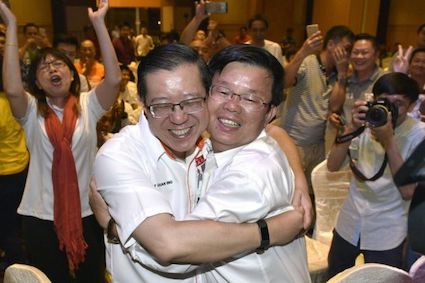Grandiose projects facing road bumps in Penang

By Joceline Tan, The Star
HAD the Penang undersea tunnel project taken off, it would have been the most glamorous and ambitious infrastructure in the state.
Instead, the project seems doomed and is currently at the centre of a sensational corruption case involving former chief minister Lim Guan Eng.
The project, mooted at the height of Pakatan Harapan’s popularity, is likely to be aborted, with a third bridge being the preferred alternative.
Mega projects have been a hallmark of the DAP-led state government since the day they swept into power in Penang.
There have been proposals of making Penang a local city with cable cars, a light rail transit system, highways and man-made islands.
This was a government with big dreams to put Penang on par with Hong Kong or even Singapore.
The undersea tunnel would be one of those legacy projects to showcase Lim’s leadership and seal the DAP’s place in the future of Penang.
The RM6.3bil undersea tunnel project grabbed the people’s imagination from the get go.
“It was to connect the island’s golden triangle (Gurney Drive, Pulau Tikus and Tanjung Bungah) to the Butterworth side where there is a growing middle class populace. Linking these two locations would have created so many opportunities,” said a Penang-based journalist.
Chief Minister Chow Kon Yeow took a couple of days to respond after The Star broke the story that the undersea tunnel might be replaced by a bridge.
It is obvious that a third link is not Chow’s priority for now. The project is the former chief minister’s baby and Chow would not want to be stuck rocking the cradle.
Ties between the sitting and former chief ministers have been quite tense after Lim openly criticised the state government’s handling of the pandemic.
Lim still casts a long shadow over Penang where he is dubbed the “weekend CM” when he makes constituency visits while Chow is the “weekday CM”.
Chow is probably aware that sounding the death knell on Lim’s dream scheme would further strain their relationship.
Besides, Chow has his own dream project to create three man-made islands to the south of Penang island.
However, a PKR MP from Penang insisted that the third link has to be done because it is part of Pakatan’s election manifesto.
“I’m a practical person. If a bridge is cheaper and can get the approval of the Federal authorities, then it should be the option,” said the MP.
Others insist the state should invest in public transportation instead of infrastructure that only generates more traffic.
“We need to stop this nonsense of having the tallest, the biggest and the longest,” said a Penang industrialist.
Development – whether too much or too little of it – has always been a political issue in Penang.
The secret to DAP’s success has been in understanding the Chinese mindset. The party tapped into Chinese discontent over Umno and Malay privileges.
In Penang, it quickly realised that while the older generation romanticised about old-world Penang, younger people craved development and modern amenities.
The Pakatan government lost no time in pushing the development agenda after taking over in 2008 and the way Penangites embraced it must have come as a shock to those still clinging to the “charm of old Penang” fairy tale.
Promises of development are about selling a dream to young voters who are the vote bank of the future.
“Many of them were okay with building the undersea tunnel but the Opposition did such a good job at throwing monkey wrenches at it. On the side, Pakatan was unable to argue why the project was necessary,” said the journalist.
It is quite ironic that the state government is now under pressure to explain why grandiose projects have trouble taking off.
After more than a decade, things have plateaued and the above Penang journalist pointed out that it was actually projects that began during the Barisan rule that gave Penang a boost after 2008.
The second bridge, built during Tun Abdullah Ahmad Badawi’s premiership, turned the backwaters of Batu Kawan on the mainland into a boom town.
On the island, the Gerakan-led government worked for years to get Unesco to recognise Georgetown’s inner city as a World Heritage Site. The recognition came a few months after Pakatan took over and it took tourism to a new level.
According to Jeff Ooi, an IT consultant and former Jelutong MP, the proverbial pendulum tends to swing every 15 years and Pakatan is now inching towards that point.
“We talk of a report card every election, they will have to show what they have delivered,” said Ooi.
Pakatan still has some good years left but this will start to taper off if they are not careful.
Lim did manage to create a new beginning for Penang as its chief minister but his image plunged after he became finance minister. His Chinese base felt that his party failed to stand up to Tun Dr Mahathir Mohamad.
Chow does not have the vision or dynamism of his predecessor but he is likeable and easy to work with. The journalists love him because he is courteous and does not insult them in public.
There is a two-term limit on the Penang chief minister post but some doubt that Chow may be able to retain the job even though Pakatan is expected to easily retain Penang in the general election.
Political observers in Penang see a potential challenger in the form of Bukit Mertajam MP Steven Sim who will be moving to a state seat and something bigger.
Sim is seen as a keen supporter of Lim who, together with his father Lim Kit Siang, will have a say over the chief minister post.
Pakatan will have to work harder to achieve another two-thirds majority victory in Penang otherwise there will be a challenge to Chow’s leadership.

